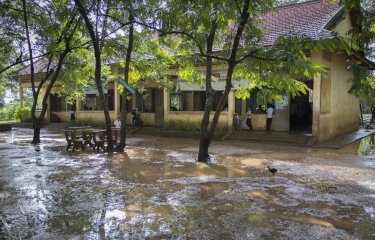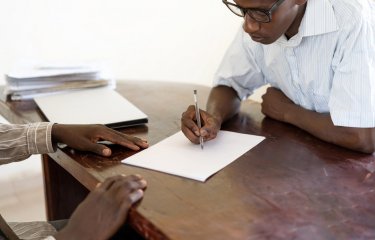The decision to set up an Institut Pasteur in Guinea was made in 2014 in response to the Ebola crisis. It reflects the joint determination of France and Guinea to tackle emerging outbreaks on a long-term basis for the welfare of the population. When the COVID-19 pandemic struck, how was this young institute able to fulfill its remit as a front-line laboratory?

The pace picked up very quickly, so that the Institut Pasteur de Guinée team, composed of two technicians and one post-doctoral fellow in charge of the laboratory, soon found themselves processing 180 diagnostic tests a day, seven days a week. Thanks to emergency funding from the Agence française de Développement (AFD), the institute was able to acquire reagents, protective and diagnostic equipment to meet rising demand for testing. The team was also expanded, enabling the staff to work in shifts and to deliver PCR-type COVID diagnostics training to almost a dozen individuals.
"This emergency support enabled the institute to secure long-term diagnostic capabilities and hence to control the first wave of the outbreak in Guinea," explains Dr. Solène Grayo, post-doctoral fellow and specialist in viral hemorrhagic fevers and COVID-19 at the Institut Pasteur de Guinée.
Throughout 2020, the institute worked with three sites: Donka referral hospital, the military hospital at Camp Alpha Yaya, and the French Embassy's medical center. Case numbers gradually fell, leading to less frequent sampling. However, two full-time staff members are still exclusively assigned to testing in a bid to improve control of the outbreak.
Developing expertise to participate in major COVID-19 projects
Until December 2020, COVID-19 cases were caused by the primary viral strain. However, the team witnessed increasing levels of virulence at a time when variants were already circulating in Europe.
"We sensed that variants were present in Guinea as the PCR amplification patterns were different to those observed thus far," comments Dr. Grayo. "We did not have the sequencing tools to identify variants. Through the Pasteur Network, we were able to send a panel of samples to the Institut Pasteur de Dakar, which confirmed to us that variants were indeed present, although not in the majority of samples."
Given the potentially serious impact of the COVID-19 pandemic on African countries, the ten African Pasteur Network member institutes joined forces through the REPAIR project. Funded by the French Ministry of Europe and Foreign Affairs, its aim is to conduct an applied research program to understand the circulation of SARS-CoV-2 on the African continent. Joining this project and particularly its diagnostics, sequencing, and epidemiological research components, has enabled the Institut Pasteur de Guinée to benefit from other partners' expertise in these three areas.
Sequencing: a vital tool for early detection of variant spread
The Alpha variant arrived in Guinea in early 2021, spreading quickly until late March 2021 and co-circulating with the Eta variant, also known as the "Nigerian variant", until April 2021. The Delta variant emerged in Guinea in May. Given the permanent and increasing co-circulation of these variants, the ability to perform sequencing independently is becoming an essential factor.
"Sequencing is a crucial technique for monitoring the circulation of variants in this country and examining genome evolution," adds Dr. Grayo. "We received initial training from the Institut Pasteur Laboratory for Urgent Response to Biological Threats (CIBU), which familiarized us with sequencing tools such as MinION. Through the REPAIR project, we acquired the appropriate reagents and consumables for this equipment. We are currently engaged in a development phase in which we continue to draw on Institut Pasteur de Dakar expertise and are therefore dependent on airfreight. We have a delayed view of variant circulation, which is not ideal for monitoring the outbreak."
To meet this increased demand for sequencing, the Institut Pasteur de Guinée joined AFROSCREEN, a major new project officially launched in July 2021. Funded by the AFD and run by the ANRS-MIE, IRD, and the Institut Pasteur, this two-year project aims at boosting the sequencing capabilities of laboratories in 13 Sub-Saharan African countries with a view to monitoring the evolution of SARS-CoV-2 variants and other emerging pathogens. The project will provide the team put in place with financial support, training, sequencing equipment, reagents, and consumables. Project partners will share their data through the GISAID open-access database, which will enable monitoring and improved understanding of circulation in the region.
"Since Africa is behind in terms of its vaccination roll-out, we must monitor variants through sequencing. With pupils returning to school and increasing international trade due to the economic recovery, the risk of a new wave of the outbreak cannot be ruled out. We need to be able to meet this demand for sequencing right now," says Dr. Grayo.
In the long term, this increase in the institute's capacity and expertise will enable real-time control of outbreaks in Guinea and prevent other pandemics. With this early warning system for virus spread in place, the health authorities will be able to trigger effective ad hoc strategies for prevention, patient management, and occasional vaccination of certain populations.





